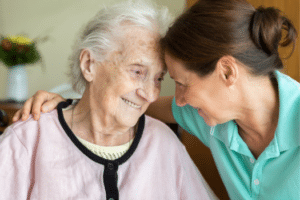Having my mom live far away from me is tough. We chat on Skype a few times per month, but it never feels like it’s enough. Although we catch up and share laughs, I used to feel concerned that I wasn’t doing as much as I should; I’d been able to figure out what she needed, but wasn’t sure how to get it when I lived far away. When she mentioned trouble hearing or back pain, I tried suggesting that she see a doctor—yet I knew that wasn’t the same as me actually being there to take her. I’d also discovered that she needed encouragement to exercise regularly and be more social. To ensure my mom had the right support, I began looking into the best ways to do this from a distance.
Practical Ways to Assist Your Loved One From Afar
Research and reach out online
These days, you can find just about anything online—from obscure baseball trivia to vintage sneakers. Amazingly, this also means that a quick search for services and programs in your aging parent’s city will instantly produce a slew of relevant options. You can easily search online for doctors, social activities, or virtual senior centers for your loved one. I managed to find a community exercise class for older adults by looking online, then phoned up the center to ask a few questions. Now my mom enjoys going once a week. The Internet’s also full of supportive discussion forums with helpful people. From location-specific Facebook groups to forums geared toward children caring for older parents, these are great places to ask questions and get suggestions. Chances are that other folks online will have tips to help—all you have to do is ask.
Find a supportive caregiver or friend
One of the best ways to ensure your loved one is alright is to have a trusted caregiver or friend visit them. After you’ve determined that your loved one needs extra assistance at home, find out what exactly they need help with. Do they need transportation to social activities or medical appointments? What about cleaning, running errands, buying groceries, or food preparation? Help with medication management? Maybe they simply need companionship? When you know what your loved one needs, find a trusted friend or caregiver locally that can provide these services. When searching for professional caregivers, ask around for personal recommendations and look online for reputable organizations. Make sure they have the requisite certifications and training, and ask for testimonials and to meet with them over Skype.
Have them accompanied to appointments
Ask a trusted friend or a professional caregiver to accompany your loved one to doctor’s appointments. Not only does a lot of information get shared during appointments, but they can be frightening or exhausting to go to alone. This offers them comfort, as well as a second set of eyes and ears to receive information and ask relevant questions. You may ask your friend or caregiver to keep you in the loop about what happens. Home care professionals are trained to support aging adults, and will know what information is important. Your parent might not want to tell you everything about their health, so hearing it from someone who was at the appointment is sometimes the best way to make sure they’re doing okay.
Also, get updates from the doctor yourself. To do this in accordance with HIPAA, explain to the doctor that you’d like to stay abreast of your loved one’s health. They’ll ask the patient for consent, and follow through with any necessary paperwork. This might include getting written permission and signing forms in front of a notary. You can ask for copies of the official HIPAA forms so you have all the info on hand, and repeat this process with all of your loved one’s healthcare providers.
Check in with your loved one
Continuing to check in regularly is not only good for their health and happiness, but will also help you ensure that no additional help is needed. Use compassionate communication to ask how their week has been, any complaints they have, or how they feel about their caregiver. Along with regular Skype chats, keep a calendar with relevant information including your loved one’s doctor’s appointments, and any symptoms or concerns they share with you. IOA has a handy app for this. You can also choose to share this calendar with other family members or their professional caregiver.
In addition to chatting regularly through Skype, empower your loved one with some additional resources they can access on their own: assistive technology devices for older adults and online senior centers are both useful tools for your aging parents to have at their fingertips. IOA’s Friendship Line is a particularly helpful resource, as well—if your loved one is feeling sad, depressed, distressed, or simply wants someone to talk to, they can call the Friendship Line at any time. Ensure your loved one has all important phone numbers on hand—yours, the caregiver’s, and doctor’s—in case of emergency. Between digital technology and in-person care, there are plenty of ways to connect your loved one with resources from a distance: with a bit of effort and love, you can help your aging parent feel supported even when they live far away.
Institute on Aging provides caregiver services for older adults in the Bay Area. If you’d like to consult us for more information about hiring a home care professional, or any of our programs or services, get in touch with us today.







